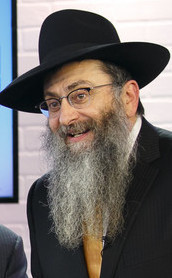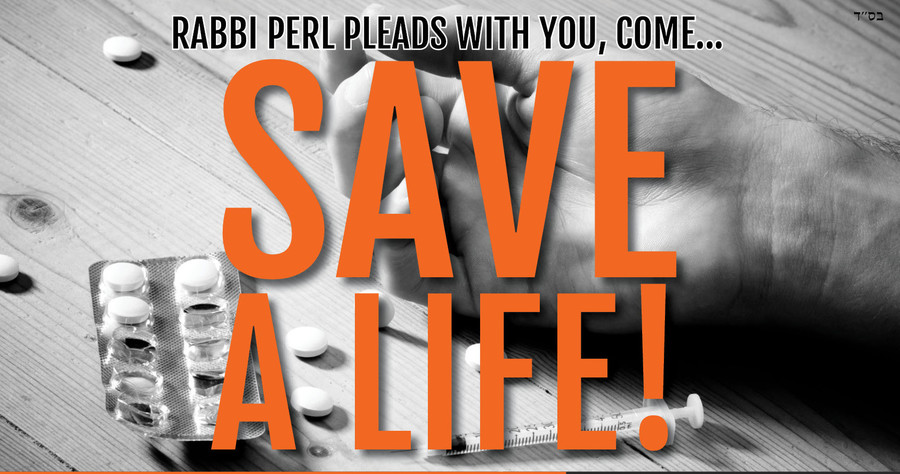Rabbi Perl tackles opioid addiction on Thursday
Rabbi Anchelle Perl, like many of his fellow Chabad shaliachs, knows a thing of two about attracting attention to a good cause (think Chanukah menorahs in public spaces).
The cause on Rabbi Perl’s agenda right now is a matter of life and death throughout Long Island, including in its Torah-observant communities.
“There is a heroin epidemic here on Long Island,” said Rabbi Perl. “It’s impacting our communities.”
On Thursday, Jan. 19, from 7 to 8:30 pm, Rabbi Perl will host free Narcan training at Chabad Mineola, 261 Willis Ave. in Mineola. The training, given by Chas Thompson, fire commissioner of Lido Point Lookout and an EMT for 37 years, is free and open to anyone over age 18.
Narcan is a drug that reverses the effects of heroin or opioid overuse. The program will be introduced by a woman who saved her son from an overdose by using Narcan.
“You will be trained to react to an overdose and administer the antidote that can save a life,” reads a promotion for the event. “Research has shown that with basic training, non-medical professionals such as friends, family members, or even concerned bystanders, can administer Narcan and save a life.”
“Rabbi Perl pleads with you, come SAVE A LIFE,” the promotion says.
“Our goal is to make it ‘kosher’ to become an overdose responder,” Rabbi Perl said, “and more importantly, through this program, to build a caring community that is aware of and responsive to the problems of heroin and [which] supports individuals and families who struggle with addiction.”
Nassau County continues to battle a heroin and opiate epidemic that has taken many lives, and Narcan has already saved hundreds of lives, according to numerous reports.
Rabbi Perl devoted a segment of his Chanukah telethon to raising awareness of the opioid epidemic, and to caution frum viewers that their families and friends are not imune.
On Dec. 14, Rebecca Glassman of West Hempstead spoke at a gathering in Woodmere that confronted the issue of adiction in the Orthodox community. Her son, Aryeh Nathan Glassman, died from a heroin overdose in May.
She addressed a packed, largely Orthodox, audience.
Aryeh was one of 93 people in the Orthodox Jewish community in the metropolitan area to die of an overdose or a substance abuse-related incident such as a vehicular accident since September of 2015, according to Rabbi Zvi Gluck, founder and director of Manhattan-based Amudim, an organization that helps young people overcome sexual, physical and substance abuse.
“The stigma attached with addiction is no longer being brushed under the rug, the turnout here shows the tide is turning,” said Rabbi Gluck. “I do not know of a yeshiva high school in our [Orthodox Jewish] community that doesn’t have drugs in it.”
“Ari was brought up in an Orthodox home, not unlike many of the people here,” Glassman told the Woodmere crowd. “He attended yeshiva from nursery aleph as a three year old, through the 12th grade. He was given all of the things that parents give their kids including love and emotional support. He was cherished from the time he was born even through adulthood and through his addiction.
“How did my son, the product of an Orthodox family, educated in a yeshiva, become an addict? After all, doesn’t drug abuse only exist in the outside world? How can this happen to us? As far as I was concerned, drug addicts came from public schools and the inner cities, broken homes, and homes where there is abuse. Drugs were found in poverty stricken areas like the slums, and areas where there is a lack of education.
“We know that drug use has become rampant among the yeshiva students. I was told by several mothers that they were aware that students were leaving school during lunch breaks to use drugs and somehow no one was the wiser. Why weren’t the teachers, administrators and parents on top of this?
“Drug addiction does not discriminate between the races, religions or genders. It affects us all in one way or another.
“Many in the Orthodox community don’t believe it could happen to them. Sadly, my family is an example of the fact that it can.”
To reach Rabbi Perl, call 516-739-3636 or email rabbiperl@chabadmineola.com, ot visit chabadmineola.com/narcan.

 44.0°,
Mostly Cloudy
44.0°,
Mostly Cloudy 







